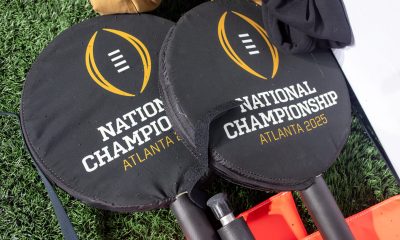Lifestyle
PRESS ROOM: Twenty Marching Bands Selected To Join 2020 Rose Parade®
LOS ANGELES SENTINEL — The Pasadena Tournament of Roses® has selected 20 of the marching bands that will participate in the 131st Rose Parade presented by Honda.
By Sentinel News Service
The Pasadena Tournament of Roses® has selected 20 of the marching bands that will participate in the 131st Rose Parade presented by Honda, themed “The Power of Hope.” The bands will travel to Pasadena from across the United States, from Puerto Rico to Hawaii, and around the world, including Costa Rica, Denmark, El Salvador, Japan, and Mexico.
Thousands of performers will enjoy the experience of a lifetime when they march down Colorado Blvd. on January 1, 2020, each with their own unique story. Visit https://tournamentofroses.com/events/about-rose-parade/#participants to discover more about each band.
The bands selected are listed below, alphabetically.
Alhambra Unified School District Marching Band Alhambra, California
Baldwinsville Marching Bees Baldwinsville, New York
Banda El Salvador: Grande Como Su Gente El Salvador
Banda Municipal de Zarcero Alajuela, Costa Rica
Centro Escolar Niños Heroes De Chapultepec Puebla, Mexico
Centenaria Banda Colegial – University of Puerto Rico Mayaguez, Puerto Rico
Dobyns-Bennett High School Kingsport, Tennessee
Greendale High School Marching Band Greendale, Wisconsin
Helsingør Pigegarde Hornbaek, Denmark
Japan Honor Green Band Kyoto, Japan
Kamehameha Performing Arts Ensemble Honolulu, Hawaii
Los Angeles Unified School District All District Honor Band Los Angeles, California
The PRIDE of Owasso Owasso, Oklahoma
The Pride of Pearland Marching Band Pearland, Texas
Pasadena City College Tournament of Roses Honor Band Pasadena, California
Rancho Verde Crimson Regiment Moreno Valley, California
Southern University “Human Jukebox’ Marching Band Baton Rouge, Louisiana
Tournament of Roses Salvation Army Band Pasadena, California
United States Marine Corps West Coast Composite Band San Diego, California
West Harrison Hurricane Band, The Pride of South Mississippi Gulfport, Mississippi
Bands are selected by volunteer members of the Tournament of Roses based on a variety of criteria including musicianship, marching ability and entertainment or special interest value. In addition to marching in the five-and-a-half-mile Rose Parade on New Year’s Day, bands also perform in one of three Bandfest events scheduled for December 29 and 30, 2019 at Pasadena City College. There are two bands that will be added to the line-up when the universities participating in the 106th Rose Bowl Game® presented by Northwestern Mutual are determined in December.
Bands who would like to participate in the 2021 Rose Parade are encouraged to apply through an online application, available now on the Tournament of Roses website; https://tournamentofroses.com/events/apply/.
This article originally appeared in the Los Angeles Sentinel.
Activism
Big God Ministry Gives Away Toys in Marin City
Pastor Hall also gave a message of encouragement to the crowd, thanking Jesus for the “best year of their lives.” He asked each of the children what they wanted to be when they grow up.

By Godfrey Lee
Big God Ministries, pastored by David Hall, gave toys to the children in Marin City on Monday, Dec. 15, on the lawn near the corner of Drake Avenue and Donahue Street.
Pastor Hall also gave a message of encouragement to the crowd, thanking Jesus for the “best year of their lives.” He asked each of the children what they wanted to be when they grew up.
Around 75 parents and children were there to receive the presents, which consisted mainly of Gideon Bibles, Cat in the Hat pillows, Barbie dolls, Tonka trucks, and Lego building sets.
A half dozen volunteers from the Big God Ministry, including Donnie Roary, helped to set up the tables for the toy giveaway. The worship music was sung by Ruby Friedman, Keri Carpenter, and Jake Monaghan, who also played the accordion.
Big God Ministries meets on Sundays at 10 a.m. at the Mill Valley Community Center, 180 Camino Alto, Mill Valley, CA Their phone number is (415) 797-2567.
Advice
BOOK REVIEW: Let Me Be Real With You
At first look, this book might seem like just any other self-help offering. It’s inspirational for casual reader and business reader, both, just like most books in this genre. Dig a little deeper, though, and you’ll spot what makes “Let Me Be Real With You” stand out.

By Terri Schlichenmeyer
Author: Arshay Cooper, Copyright: c.2025, Publisher: HarperOne, SRP: $26.00, Page Count: 40 Pages
The hole you’re in is a deep one.
You can see the clouds above, and they look like a storm; you sense the wind, and it’s cold. It’s dark down there, and lonesome, too. You feel like you were born there — but how do you get out of the deep hole you’re in? You read the new book “Let Me Be Real With You” by Arshay Cooper. You find a hand-up and bring someone with you.
In the months after his first book was published, Cooper received a lot of requests to speak to youth about his life growing up on the West Side of Chicago, his struggles, and his many accomplishments. He was poor, bullied, and belittled, but he knew that if he could escape those things, he would succeed. He focused on doing what was best, and right. He looked for mentors and strove to understand when opportunities presented themselves.
Still, his early life left him with trauma. Here, he shows how it’s overcome-able.
We must always have hope, Cooper says, but hope is “merely the catalyst for action. The hope we receive must transform into the hope we give.”
Learn to tell your own story, as honestly as you know it. Be open to suggestions, and don’t dismiss them without great thought. Know that masculinity doesn’t equal stoicism; we are hard-wired to need other people, and sharing “pain and relatability can dissipate shame and foster empathy in powerful ways.”
Remember that trauma is intergenerational, and it can be passed down from parent to child. Let your mentors see your potential. Get therapy, if you need it; there’s no shame in it, and it will help, if you learn to trust it. Enjoy the outdoors when you can. Learn self-control. Give back to your community. Respect your financial wellness. Embrace your intelligence. Pick your friends and relationships wisely. “Do it afraid.”
And finally, remember that “You were born to soar to great heights and rule the sky.”
You just needed someone to tell you that.
At first look, this book might seem like just any other self-help offering. It’s inspirational for casual reader and business reader, both, just like most books in this genre. Dig a little deeper, though, and you’ll spot what makes “Let Me Be Real With You” stand out.
With a willingness to discuss the struggles he tackled in the past, Cooper writes with a solidly honest voice that’s exceptionally believable, and not one bit dramatic. You won’t find unnecessarily embellished stories or tall tales here, either; Cooper instead uses his real experiences to help readers understand that there are few things that are truly insurmountable. He then explains how one’s past can shape one’s future, and how today’s actions can change the future of the world.
“Let Me Be Real With You” is full of motivation, and instruction that’s do-able for adults and teens. If you need that, or if you’ve vowed to do better this coming year, it might help make you whole.
Activism
Oakland Post: Week of December 24 – 30, 2025
The printed Weekly Edition of the Oakland Post: Week of – December 24 – 30, 2025

To enlarge your view of this issue, use the slider, magnifying glass icon or full page icon in the lower right corner of the browser window.
-

 Alameda County4 weeks ago
Alameda County4 weeks agoSeth Curry Makes Impressive Debut with the Golden State Warriors
-

 Bay Area2 weeks ago
Bay Area2 weeks agoPost Salon to Discuss Proposal to Bring Costco to Oakland Community meeting to be held at City Hall, Thursday, Dec. 18
-

 #NNPA BlackPress4 weeks ago
#NNPA BlackPress4 weeks agoFBI Report Warns of Fear, Paralysis, And Political Turmoil Under Director Kash Patel
-

 Activism2 weeks ago
Activism2 weeks agoMayor Lee, City Leaders Announce $334 Million Bond Sale for Affordable Housing, Roads, Park Renovations, Libraries and Senior Centers
-

 Activism3 weeks ago
Activism3 weeks agoOakland Post: Week of December 10 – 16, 2025
-

 Arts and Culture2 weeks ago
Arts and Culture2 weeks agoFayeth Gardens Holds 3rd Annual Kwanzaa Celebration at Hayward City Hall on Dec. 28
-

 Activism2 weeks ago
Activism2 weeks agoOakland School Board Grapples with Potential $100 Million Shortfall Next Year
-

 Activism2 weeks ago
Activism2 weeks ago2025 in Review: Seven Questions for Black Women’s Think Tank Founder Kellie Todd Griffin
























































